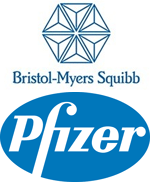Portola, Bristol-Myers Squibb and Pfizer announce statistically significant results from the first part of the Phase 3 ANNEXA™-A studies of investigational Andexanet Alfa with Eliquis (apixaban)
Posted: 18 November 2014 | | No comments yet
Bristol-Myers Squibb Company and Pfizer Inc. announced results from the first part of the Phase 3 ANNEXA™-A (Andexanet Alfa a Novel Antidote to the Anticoagulant Effects of fXA Inhibitors – Apixaban) studies…


Bristol-Myers Squibb Company (NYSE: BMY) and Pfizer Inc. (NYSE: PFE) today announced results from the first part of the Phase 3 ANNEXA™-A (Andexanet Alfa a Novel Antidote to the Anticoagulant Effects of fXA Inhibitors – Apixaban) studies. Andexanet alfa produced rapid and nearly complete reversal (by approximately 94 percent, p value <0.0001) of the anticoagulant effect of Eliquis (apixaban) in healthy volunteers ages 50-75. The full data set will be presented today in an oral presentation during the “Clinical Science: Special Reports” session at the American Heart Association (AHA) 2014 Scientific Sessions in Chicago, IL.
This first part of the Phase 3 ANNEXA-A trial achieved all of its primary and secondary endpoints with statistical significance (p value <0.0001). The trial included 33 subjects, with 24 randomized to andexanet alfa and nine to placebo. In the study, two to five minutes after completion of a bolus dose of andexanet alfa, the anticoagulant activity of Eliquis was reversed by approximately 94 percent (p value <0.0001) compared with placebo as measured by anti-Factor Xa activity. Every subject treated with andexanet alfa had between 90 and 96 percent reversal of the anticoagulant activity of Eliquis. The reversal of anti-Factor Xa activity correlated with a significant reduction in the level of free, unbound Eliquis in the plasma, consistent with the mechanism of action of andexanet alfa. Additionally, andexanet alfa restored thrombin generation to baseline normal levels (prior to Eliquis therapy). In this study, no serious adverse events, thrombotic events, or antibodies to Factor X or Xa were reported following andexanet alfa administration. Mild infusion reaction was reported in three subjects.
“The statistically significant reversal of the anticoagulant effect of Eliquis demonstrated in all subjects receiving andexanet alfa, an FDA-designated breakthrough therapy, reinforces our commitment to bring this antidote to market as quickly as possible under an Accelerated Approval pathway,” said John T. Curnutte, M.D., Ph.D., executive vice president, research and development for Portola. “Andexanet alfa is unique. Andexanet alfa rapidly reversed Anti-Xa activity with high specificity and a well-understood mechanism of action. We believe andexanet alfa could be the first universal Factor Xa inhibitor antidote available for anticoagulated patients who are experiencing a major bleeding event or those needing emergency surgery.”
“Bristol-Myers Squibb and Pfizer’s collaboration with Portola for the development and evaluation of andexanet alfa with Eliquis further demonstrates our commitment to delivering innovative therapies,” said Dr. Steven Romano, senior vice president and head, Medicines Development Group, Pfizer Global Innovative Pharmaceutical Business. “We are pleased with the positive results of this ANNEXA-A study, which demonstrated a rapid and near complete reversal of the anticoagulant effects of Eliquis. We look forward to the completion of the second part of this study.”
“Eliquis has proven to be an important treatment option for patients at risk for blood clots due to nonvalvular atrial fibrillation and venous thromboembolism,” said Douglas Manion, M.D., head of specialty development, Bristol-Myers Squibb. “Currently, there is no antidote to Eliquis. Andexanet alfa has the potential to be an effective option for patients who may require reversal of the anticoagulation effects of Eliquis.”
ANNEXA-A Study Design
The randomized, double-blind, placebo-controlled Phase 3 ANNEXA-A study is evaluating the safety and efficacy of andexanet alfa in reversing Eliquis-induced anticoagulation in older healthy volunteers ages 50-75. Efficacy is being evaluated using biomarker endpoints, including anti-Factor Xa levels as the primary endpoint. Secondary endpoints include levels of plasma unbound (free fraction) of Eliquis and thrombin generation levels.
In the first part of the ANNEXA-A study, reported today, 33 healthy volunteers (ages 50-73) were given Eliquis 5 mg twice daily for four days and then randomized in a 3:1 ratio to andexanet alfa administered as a 400 mg IV bolus (n=24) or to placebo (n=9). In the second part, 32 healthy volunteers will be given Eliquis 5 mg twice daily for four days and then randomized in a 3:1 ratio to andexanet alfa administered as a 400 mg IV bolus followed by a continuous infusion of 4 mg/min for 120 minutes or to placebo. Data from the second study are expected in early 2015.
Addressing the Absence of a Factor Xa Inhibitor Antidote
Currently, millions of patients are treated with Factor Xa inhibitors for short-term use or chronic conditions, and the anticoagulant market is expected to continue to grow. Recent patient data1 confirm earlier clinical trial results showing that, annually, between 1-4 percent of patients treated with Factor Xa inhibitors may experience major bleeding and an additional 1 percent may require emergency surgery. Development of a specific antidote designed to reverse the anticoagulant activity of Factor Xa inhibitors may provide an important treatment option for patients who experience a major bleeding event or require emergency surgery.
*Cerdulatinib is a proposed International Nonproprietary Name (pINN).
- Source: Truven MARKETSCAN® Commercial, Medicare Supplemental and Medicaid Database (12 months ending September 2013).




